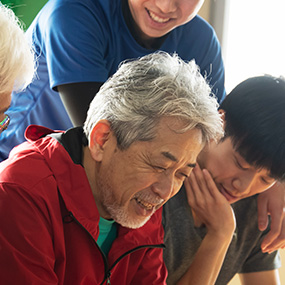Supervision Masataka Fukao / Vice President, Professor, Faculty of Policy Science, Ryukoku University
00.Is the problem a social issue? Is it an individual’s own responsibility?
As the term ‘social issues’ suggests, these are issues within society. Conversely, individual issues can be categorized under the term ‘personal responsibility’. Is it a social issue or a personal responsibility when a child does not attend school? What about ‘not having the money to buy sanitary napkins’ or ‘not having a place to sleep’?
Questioning the boundaries of these issues is the first main battleground in social business. The newer the issue is to society, the more friction there will be.
“The history of social initiatives has always been built on hardship and struggle,” says Professor Masamine Fukao of Ryukoku University’s Faculty of Policy Science, who has been researching the social field for more than 15 years and has been involved in a number of projects himself.
For example, let’s look at truancy. In the past, it was called ‘refusal to go to school’ and was considered as if it were the fault of the parents or the children. Today, however, there is a shift toward questioning schools and school rules. In retrospect, those involved have a history of being pilloried by and told not to put the responsibility on society. That history has led us to where we are today.
The realization of social good lies ahead, spiraling forward and backward but never halting. “Tenacious and steady. That is the essence of ‘social’.”
01.Solidarity in Purpose, Beyond Ideology
It is painful to keep walking while having stones thrown at you, especially if you are alone. The key to overcoming this challenge is solidarity with others who share the same awareness of the issues. However, Professor Fukao points out that there is a major pitfall here. The excessive pursuit of ideological unity within a team could lead to fragmentation:
“There are many cases in which people are united by a passion to improve society, but this causes fragments because they cannot tolerate differences in ideology. It would be a complete misfortune to fail because of this. The ultimate goal is not to judge right from wrong, but to take a macro viewpoint to improve the issue as much as possible. I believe that an attitude of not giving up on mutually acceptable lines or third paths will create sustainable impetus.”
02.Dissolving Resignation and Uncovering Needs
The world becomes aware of the problem, society’s values change, and systems and social services are enhanced. While this is a legitimate procedure for solving problems, it requires enormous time and effort. In the case of social business, it is possible to take a downstream approach by identifying needs. This is the advantage of taking the form of a business, according to Professor Fukao:
“Even if we try hard to raise the issues, it’s difficult to change social systems and values. In many cases, even the person in need accepts the current situation. However, when tangible goods and services appear, that person will realize that there is the possibility of a solution. In this way, as problems become more visible, institutions and values change.”
Many of those in trouble have given up, assuming they have no choice. Dissolving this resignation and transforming it into a need will increase sustainability as a business and create the power to change society.
03. Turning Ordinary People into Allies
What if we feel the need to increase our allies in order to continue our social business? By widely communicating the story of how our efforts will change society, we may be able to change the behavior of a larger number of people. In Professor Fukao’s experience, there are many cases where people on the periphery, so-called ‘ordinary people’ who are neither participants nor supporters, turn into advocates:
“Because they are unaware of the issues, it’s a shock the first time people come into contact with them. In fact, the shock often pushes them to take action, such as making a donation.”
Many people have a desire to make society a better place. If they can relate to your story and know there is something they can do, they will become your allies.






























